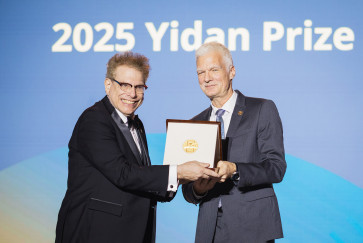Northwestern University theoretical astrophysicist Fred Rasio has received the 2019 Dirk Brouwer Career Award from the American Astronomical Society’s Division on Dynamical Astronomy (DDA).
The annual award recognizes a major contributor to the field of dynamical astronomy who demonstrates excellence in scientific research, teaching and training students, and public service.

Rasio was honored for his “profound and lasting impact in a diverse range of topics, including dynamics of dense star clusters, planetary dynamics and formation, hydrodynamic stellar interactions and gravitational wave astrophysics."
He will officially accept the award and deliver the award lecture at the DDA’s 51st annual meeting in 2020.
“The Brouwer Award is a great honor,” Rasio said. “It has been won by many of the greatest dynamicists of the past half century, including several whose seminal works have directly influenced my own research (Michel Hénon, Yoshihide Kozai, Sverre Aarseth) and some with whom I had the pleasure of interacting or even collaborating (Peter Goldreich, Douglas Lin, Stanton Peale).”
Rasio is the Joseph Cummings Professor of Physics in the Weinberg College of Arts and Sciences and a member of the Center for Interdisciplinary Exploration and Research in Astrophysics.
Rasio studies the long-term dynamics of planetary systems, including the chaotic dynamics of multi-planet systems as they evolve over billions of years. He also studies the evolution of dense stellar clusters over the history of the universe. His most recent work focuses on gravitational wave sources and the formation of massive black holes.
A leader in understanding the dynamics of compact objects, Rasio has made important contributions to understanding the formation of binary black holes. He and his group also led the investigation of planet-planet scattering as a principal process of planet formation. This work explains many diverse observations of exoplanet systems.
In addition to his research, Rasio has done significant public service to further the astronomical community. Since 2013, he has served as the editor of The Astrophysical Journal Letters, and he previously served as a scientific editor for The Astrophysical Journal (both of which are published by the American Astronomical Society). He also served as a member and co-chair of the Kavli Institute for Theoretical Physics Advisory Board and the Board of the Aspen Center for Physics.

